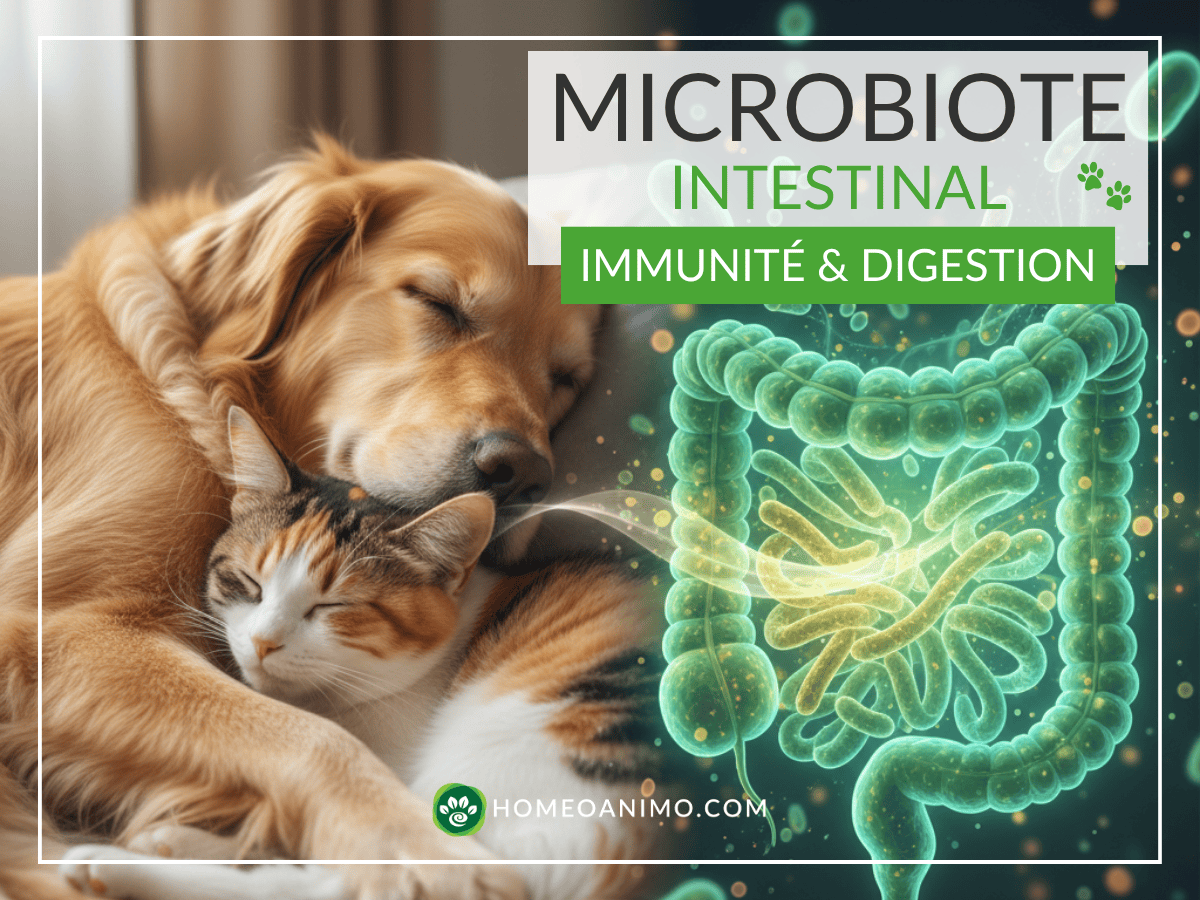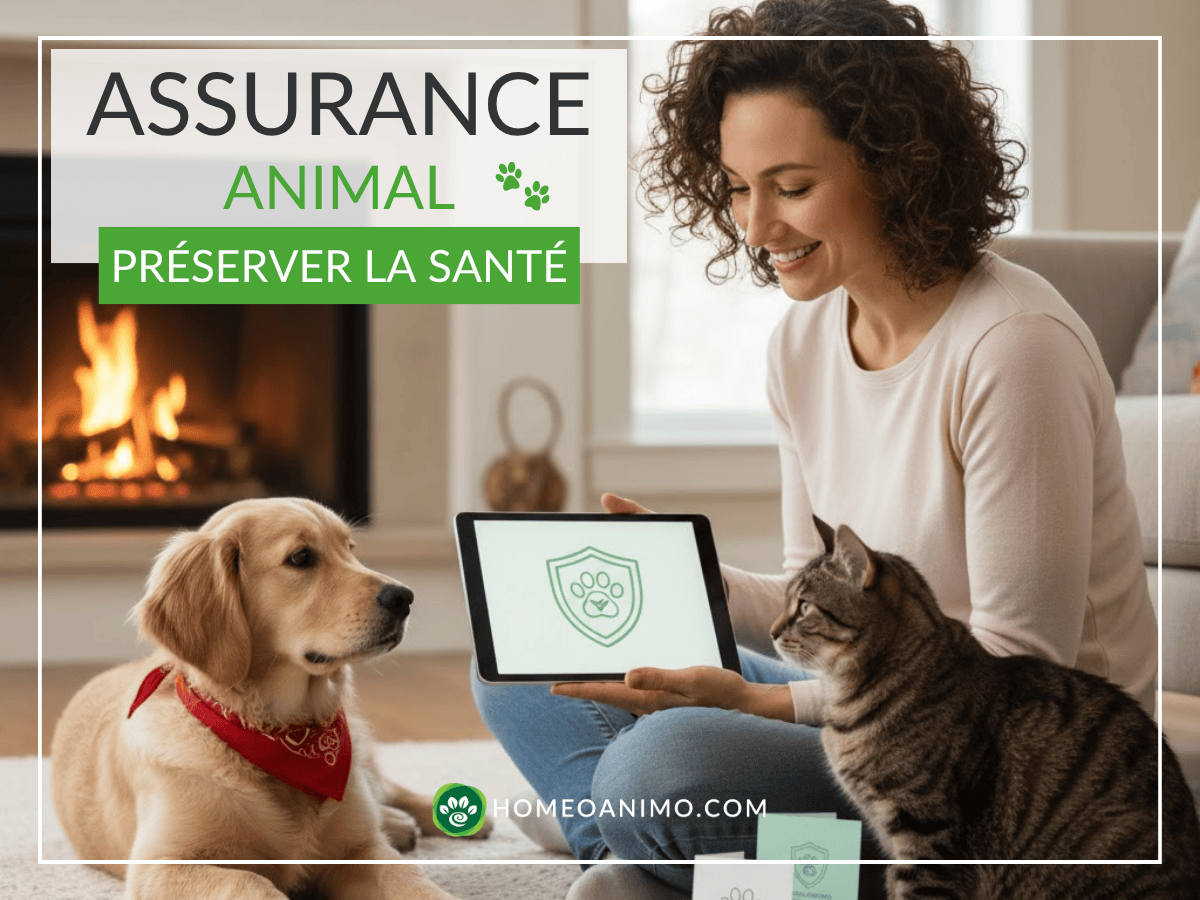
How Prebiotics and Probiotics Revolutionize Your Pet's Immunity and Digestion?
The world of animal welfare is evolving rapidly, and one topic is gaining increasing attention: the gut microbiota . Often referred to as our companions' "second brain," this complex ecosystem plays an absolutely fundamental role, far beyond simple digestion.
As a specialized naturopath, I observe daily the direct impact of intestinal imbalance on the vitality, behavior, immunity, and even the quality of our pets' coats. Understanding and supporting your dog or cat's microbiota isn't a fad; it's a necessity to ensure their long-term overall health.
What is the gut microbiota and why is it so important?

The gut microbiota is a community of microscopic organisms—primarily bacteria, but also yeast and viruses—that live symbiotically in your dog or cat's digestive tract. Billions of these microorganisms, sometimes weighing as much as your dog's brain, work tirelessly to keep your dog in good shape.
It's not just a place to live; it's a metabolic organ in its own right. A healthy microbiota is characterized by its richness and diversity . When an imbalance occurs (called dysbiosis), the door opens to a cascade of health problems. The importance of probiotics for promoting health and preventing intestinal and immune disorders in dogs and cats is a major research topic. [1] .
How does the microbiota influence immunity and defense against disease?
About 70 to 80 percent of your pet's immune cells reside around the digestive tract, in what's called gut-associated lymphoid tissue (GALT). The microbiota is the primary instructor of this canine or feline immune system.
Beneficial bacteria form a physical barrier against pathogens. They compete for space and nutrients, preventing "bad" bacteria from settling and causing infections. In addition, healthy bacteria produce compounds, such as short-chain fatty acids (SCFAs)—especially butyrate—that not only nourish the cells of the intestinal wall but also signal to the immune system whether to remain calm (tolerance) or go on the attack (defense).
An imbalanced microbiota means a poorly trained gut army, resulting in increased vulnerability to allergies, infections, and chronic inflammation.
Beyond immunity, what are the roles of the microbiota?

The microbiota is a true biological Swiss Army knife. Here are some of its essential and often underestimated roles:
- Synthesis of Vital Nutrients : Certain bacteria are responsible for the production of crucial vitamins that the animal cannot obtain or assimilate sufficiently through its diet alone, such as vitamin K and several B vitamins .
- The Gut-Brain Axis : This is a fascinating area of research. The digestive tract and brain communicate back and forth via the vagus nerve. The microbiota produces neurotransmitters (like serotonin, which is a mood modulator) that directly influence your dog or cat's behavior, mood, and stress levels. Studies [2] explored the links between dysbiosis and behavioral disorders in dogs, highlighting the therapeutic potential of probiotics.
- Skin and Coat Health : Many chronic skin problems, including itching, redness, and hot spots, can be a sign of systemic inflammation that begins in the gut. Restoring intestinal balance is often one of the first steps to achieving a shiny coat and healthy skin.
What can disrupt the balance of my pet's microbiota?

The microbiota is surprisingly sensitive. Even a minor change in environment or diet can cause dysbiosis.
- Improper Diet : Diets high in simple carbohydrates, low-quality processed foods, or abrupt dietary changes are the number one enemies of bacterial diversity for dogs and cats.
- Medications : Antibiotics are the most potent disruptors. While sometimes lifesaving, they indiscriminately kill both good and bad bacteria, leaving the gut vulnerable for weeks or even months. Steroids and anti-inflammatory drugs can also affect the intestinal lining.
- Stress : Whether it's a move, a separation, or even a visit to the vet, chronic or acute stress can alter the composition of the microbiota via the gut-brain axis.
- Parasites and Diseases : Parasitic infections or inflammatory bowel disease (IBD) create a hostile environment for beneficial bacteria.
What is the difference between prebiotics and probiotics?

This is a very common confusion! It is essential to understand that these two elements work in tandem, but play different roles:
- Probiotics : These are live microorganisms (beneficial bacteria and yeasts) that, when ingested in sufficient quantities, have a positive effect on the host's health. They act as reinforcements, temporarily colonizing the intestine and helping to restore balance.
- Prebiotics : These are indigestible dietary fibers that serve as specific food for the good bacteria already present in the colon and those you introduce through probiotics. They act as fertilizer so that the bacterial ecosystem can grow and thrive.
Imagine that probiotics are the workers arriving at a construction site, and prebiotics are the tools and food that allow them to work efficiently and stay there.
How do probiotics work to support my pet's health?
The action of probiotics is multiple and rapid:
- Flora Rebalancing : They actively displace pathogenic bacteria by preventing them from adhering to the intestinal wall.
- Improved Digestion : By helping break down food and improving nutrient absorption, they reduce digestive symptoms like gas, bloating, and diarrhea. They are especially helpful after diarrhea or antibiotic treatment.
- Direct Immune Support : Certain strains, such as Lactobacillus rhamnosus or Bifidobacterium animalis , have demonstrated an ability to modulate the immune response and strengthen intestinal barrier function.
Why are prebiotics the secret ingredient for sustainable flora?

Without prebiotics, probiotics struggle to establish themselves and survive. Prebiotics ensure long-lasting benefits by nourishing the flora.
Common prebiotic sources in animal nutrition include fructans (such as inulin, found in chicory) and oligosaccharides (such as FOS and MOS).
By providing quality food for healthy bacteria, prebiotics help to:
- Increase SCFA Production : These fatty acids (butyrate, propionate, acetate) are crucial for the energy of intestinal cells and for reducing local and systemic inflammation.
- Improve Calcium and Magnesium Absorption : Prebiotics can improve the bioavailability of certain essential minerals.
To ensure your pet's optimal health, it's often best to ensure a balanced intake of probiotics and prebiotics. Proper diet management and the addition of quality supplements are key pillars we recommend.
Are all probiotics the same and how should I choose them?
No, absolutely not. Probiotics are strain-specific, and a strain that works for humans won't necessarily work for a dog or cat. That's why it's crucial to only use formulations specifically designed for pets.
Important selection criteria:
- Species Specificity : Look for products containing strains of animal origin or specifically tested for dogs or cats (such as certain strains of Lactobacillus and Bifidobacterium adapted to canine/feline flora). For more information on strain selection criteria and effectiveness, visit the Cornell University College of Veterinary Medicine [3] provides clear guidelines.
- Quantity (CFU) : Make sure the product clearly states the Colony Forming Unit (CFU). A good product often contains billions of CFU (between 1 and 10 billion per dose) to ensure that enough survive the stomach passage.
- Prebiotic Intake : If you are using a probiotic alone, it is beneficial to supplement your pet's diet with natural prebiotic sources.
- Stability : Some probiotics require refrigeration, while others are freeze-dried to remain stable at room temperature. Stability ensures that the organisms are still alive at the time of ingestion.
Never hesitate to seek advice from your veterinarian or a specialized naturopath to determine the product and dosage best suited to your pet's specific health condition.
Are there any home remedies to support my pet's gut microbiota?

Absolutely. There are several "whole" foods that act as natural prebiotics to nourish existing flora or that are sources of natural probiotics:
- Milk or Water Kefir (Probiotic): This is one of the best sources. Kefir contains a wide variety of beneficial bacterial strains and yeasts (such as Lactobacillus kefiranofaciens and Bifidobacterium bifidum ). For animals that have difficulty digesting lactose, milk kefir is often better tolerated, as the bacteria have already consumed much of the lactose. It should be given plain and unsweetened. One study [4] highlighted its potential role in positively modulating the composition of the canine microbiota.
- High-Fiber Vegetables (Prebiotics): To feed the good bacteria, certain vegetables act as fertilizer. Pumpkin , sweet potato , asparagus , and chicory roots (or the inulin extracted from them) are excellent sources of soluble fiber and natural prebiotics. These indigestible fibers reach the colon and are fermented by the microbiota, producing the famous beneficial SCFAs.
- Raw Sauerkraut and Fermented Vegetables (Probiotic): Plain sauerkraut (unpasteurized, no vinegar or salt added) and other lacto-fermented vegetables are rich in live bacteria. A small spoonful a day (appropriate for the size of the animal) can provide a valuable boost of probiotics and digestive enzymes. It is essential that these foods be raw and unpasteurized to ensure the bacteria are alive. Research [5] supports the use of fermented products in animal feed for improving gut health.
Attention :
While these home remedies are excellent, they don't always contain the concentration and variety of pet-specific strains found in a professional-grade supplement. If your pet is suffering from an acute imbalance (chronic diarrhea, IBD, post-antibiotics), a pet-formulated probiotic remains the most effective approach for targeted support.
You can also combine a targeted probiotic like ProbioAnimo (see description below) with natural prebiotic sources like pumpkin or sweet potato for complete support!
ProbioAnimo: The High-Performance Probiotic for Long-Lasting Health
Ready to invest in the foundations of your pet's health? At HomeoAnimo, we've developed ProbioAnimo , a high-performance multi-strain probiotic specially formulated for dogs and cats.
Our expertise in animal naturopathy has guided us in the creation of a formula that provides essential bacterial reinforcements to reseed your companion's intestinal flora:
- 12 Billion CFU Guaranteed: With a powerful dose of 12 billion Colony Forming Units per day, you ensure that sufficient numbers of beneficial bacteria survive and reach the gut.
- Targeted Veterinary Strains: We use strains specifically selected for their effectiveness and ability to survive in the gastrointestinal environment of dogs and cats (including Lacticaseibacillus rhamnosus and several Bifidobacterium ).
- Multi-strain and dairy-free : Our concentrated formula provides a diversity of bacteria for comprehensive digestive and immune support, without dairy agents.
ProbioAnimo is your ideal ally for a cure after antibiotic treatment, to support animals suffering from skin allergies or chronic digestive problems, or simply to offer preventative immune support throughout the year. Don't hesitate to accompany it with natural prebiotic sources in your daily diet.
Give your pet the gift of a healthy gut. It may take a little patience, but you'll find our natural approach works deep within and respects your pet's body. Your neighbors will want to know your secret to giving your companion all its vitality!
LIVED Experience
Margrit Guigou
★ ★ ★ ★ ★
"I bought ProbioAnimo and it's a great product! I initially bought it to "stop" his loose stools, even diarrhea! I continued to give it to him (1 per day) for the winter period (on your recommendation) and it's just fantastic! His stools have always been great, very regular and well-formed! Thank you!"
Frequently Asked Questions (FAQ)
My dog already has normal stools, does he really need probiotics?
Yes, normal bowel movements are only a small part of the equation. The most important benefits of probiotics are related to immunity, nutrient absorption, and overall well-being, which are invisible functions. They act as a preventative tool, strengthening the intestinal barrier and preparing the immune system to respond effectively, for example, during periods of stress, seasonal changes, or exposure to a pathogen.
How often should I give my pet probiotics and prebiotics?
For acute support (after a bout of diarrhea, during and after antibiotic treatment), an intensive course of one to three months is recommended. For long-term support, especially if the animal suffers from allergies, recurring skin problems, or is elderly, administration can be daily or seasonal, such as a three-month course twice a year. Prebiotics, being a dietary fiber, can generally be administered daily to maintain an optimal intestinal environment.
Can there be side effects if I give too many probiotics?
Probiotics are generally very safe. However, overdoing it or introducing a new probiotic too quickly can sometimes cause mild, transient side effects, such as gas or slightly loose stools, as the system adjusts to the new bacterial population. This is more common when introducing high-fiber (FOS) prebiotics, which can ferment quickly. It is usually sufficient to temporarily reduce the dose and gradually increase it.
What is the best way to administer them to my pet?
Most pet products are available in powder form, pop-open capsules, or tasty pastes. Powder can easily be mixed into your pet's daily food (wet or raw) without affecting its effectiveness, as long as it's not mixed with hot food (excessive heat can kill live bacteria).
Conclusion
Your dog or cat's digestive tract is the true seat of their vitality. By recognizing the essential role of the microbiota, you're taking a proactive approach, rooted in naturopathy, to not only treat digestive symptoms but also strengthen the foundations of their overall health. The strategic use of probiotics and prebiotics is one of the most powerful and natural interventions you can offer your faithful companion to help them live a long, happy, and balanced life. It's the most cost-effective investment you can make in their well-being.
If you're concerned that your pet may be suffering from a health issue, our Free Pet Health Recommendation can help. In addition to receiving advice and recommendations from our Natural Health Advisors, they'll also guide you through the products and treatment options that best suit your pet's health needs.
External sources
- Gut Probiotics and Health of Dogs and Cats - PMC
- The Relationship between Canine Behavioral Disorders and Gut Microbiome - MDPI (Animals)
- The Power of Probiotics: Cornell University College of Veterinary Medicine
- Kefir Supplementation in Healthy Dogs - MDPI (Animals)
- Fermented Foods in the Canine Diet: A Review - PMC





























Leave a comment
This site is protected by hCaptcha and the hCaptcha Privacy Policy and Terms of Service apply.